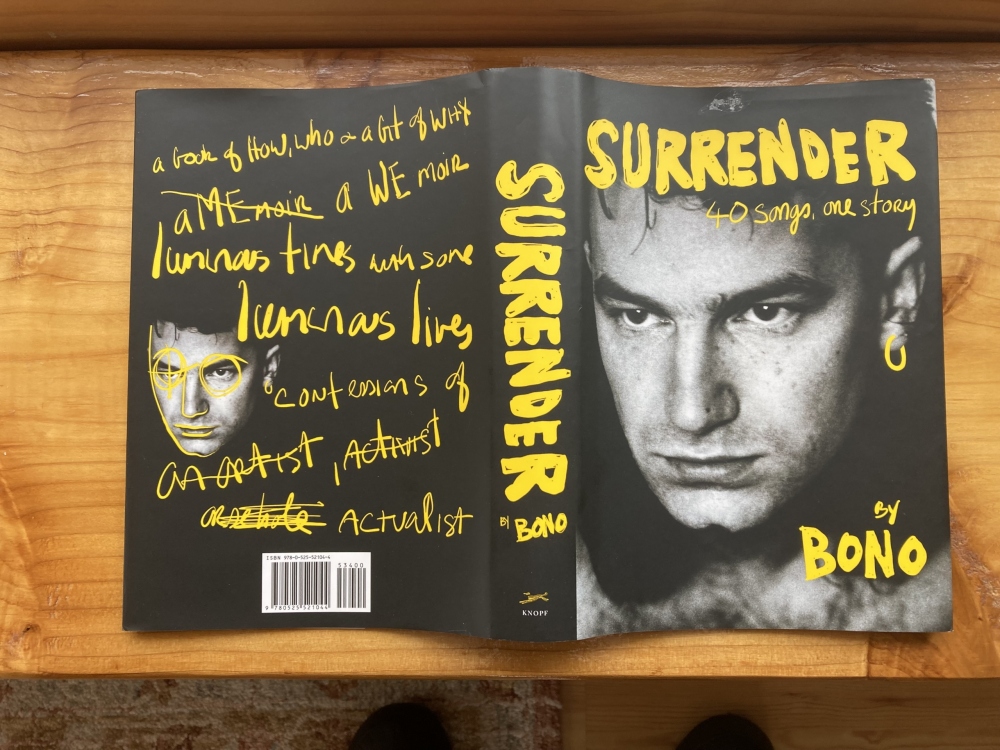The books on the shelves of my library are not merely artifacts or possessions or objects. At least that’s not how I see them. To me they are portals, thresholds, invitations to enter a new place, imaginary or real, and meet characters, imaginary or real, go on adventures, debate ideas, learn, explore meaning, have my vision of life challenged and my sense of reality broadened. Some portals turn out to be limited, like the entrance to a shallow cave that’s more like a slight indentation than a true underground cavern of discovery. And occasionally, as a gift of grace, I pick up a portal that is more than I expected, and wish I had a good friend to read and discuss it with me as I turn the pages.
I ordered a copy of Surrender as soon as it was available. I’m a fan of U2, have long appreciated Bono’s social activism and professions of faith. I love exploring how art and music shape us as individuals and permeate the wider culture. It was hard to imagine not reading it. So, I ordered it and opened it and read, and knew almost immediately that I had underestimated Bono. Three things stood out: the quality of the writing, the depth of his reflection, and the rollicking good storytelling. I should have realized that a mature lyricist might be able to compose good prose. I should have guessed from the gravity of his lyrics that Bono would think deeply about U2, justice, faith, music, and the big questions of life. And I should have known that an Irishman who has long nurtured his imagination as a rock star could spin a good yarn.
If the weather meant we couldn’t cycle all the time, leaving us to the drudgery of the bus journey, compensation would come on Fridays by being in the city center after school with the chance to visit the record store Dolphin Discs on Talbot Street. The chance to stare at album covers like the Stooges’ Raw Power or David Bowie’s Ziggy Stardust.
The only reason I wasn’t standing in Dolphin Discs at 5:30 p.m. on May 17, 1974, is that a bus strike meant we’d had to cycle to school. We were already home when the streets around Dolphin Discs were blown to bits by a car bomb in Talbot Street, another went off in Parnell Street, and another in South Leinster Street, all within minutes, a coordinated attack by an Ulster loyalist extremist group who wanted the south to know what terrorism felt like. A fourth explosion struck in Monaghan, and the final death toll stood at thirty-three people, including a pregnant young mother, the entire O’Brien family, and a Frenchwoman whose family had survived the Holocaust.
I didn’t dodge a bullet that day, I dodged carnage. Guggi’s eleven year-old brother, Andrew Rowen, aka Guck Pants Delaney, did not dodge it. He and his father, Robbie Rowen, were parked in Parnell Street when the blast hit. His father locked Andrew in the family van while he set about trying to rescue people from this destruction. Andrew watched in horror at the dismembered, purposeless bodies all around him. Years later I called him to ask if he would mind if I wrote about that day in a song called “Raised by Wolves.” Hold on a sec, he said, and when he came back to the phone, he told me he was holding a piece of shrapnel from the original car bomb. He’d kept a little piece of the bomb for forty years, evidence of trauma that had taken a little piece of him. His words. At fifteen he was in the newspapers for shooting an intruder who’d broken into the bicycle store he was minding. By twenty he was a heroin addict, sleeping rough on the streets of London. I wrote our song “Bad” about Andrew.
The Dalai Lama says you can only begin a real meditation on life with a meditation on death. Gothic stuff but something in it. Finiteness and infiniteness are the two poles of the human experience. Everything we do, think, feel, imagine, discuss is framed by the notion of whether our death is the end or the beginning of something else. It takes great faith to have no faith. Great strength of character to resist the ancient texts that suggest an afterlife.
At age fourteen, none of this was abstract. [p. 25-26]
As the subtitle suggests, Bono develops his memoir around 40 songs that act like signposts along his journey. It’s worth pausing and listening to each one as you start each of the 40 chapters in Surrender. For someone like me who is about the same age as Bono, his memoir touches on so many of the songs and bands that formed the soundtrack of my life.
In “Bono’s Great Adventure” in The Atlantic (December 22, 2022, pp. 42-49), New York Times columnist and author David Brooks writes an extended review of Surrender that is really a thoughtful, personal essay on Bono.
Brooks concludes that “three things save” Bono. The first is Ali, his wife, who Brooks sees as “the star of the memoir.” The second is Bono’s activism, working for justice in a broken world. “His activism has been the way he can take the fame life gave him and turn it into useful currency. ‘While I hope God is with us in our mansions on the hill or holiday homes by the sea,’ he writes, ‘I know God is with the poorest and most vulnerable.’”
The third thing that has saved him has been his holy longing, or as he might put it, God’s longing for him. Bono’s soul is perpetually aflame and this drives him forward, nurtures his growth and his heavenly aspirations…
The ending of his book is a beautiful evocation of peace—a riotous man’s homage to stillness. He writes the book in lyrics, not paragraphs: “The wound of my teenage years that had become an opening is now closed / the search for home is now over / it is you / I am home / no longer in exile.” Can a guy like Bono really achieve stillness? Especially when he has so much yet to say?
It’s hard to know the answer to that. At one point he told me that throughout his whole life, he’s been searching for home, and that lately he has come to realize that home is not a place, but a person. I neglected to ask the follow-up question. Is that person Ali? Jesus? Any random soul that happens to be in front of that day? Maybe all of the above. [p. 49]
Surrender is a profession of faith from someone who does not fit in the narrow categories White evangelical Christianity has created to separate itself from everyone with whom it might disagree politically, culturally, or theologically. Humility needs to accompany my understanding of Christian doctrine and practice, for I know only in part, cannot definitely prove the Gospel to every skeptic, and worst of all, without humility I can be tempted to weaponize my theology.
By the way, if you haven’t watched it, I also recommend the video, “Bono and Eugene Peterson: The Psalms” available free on YouTube. A rock star activist and pastor/Bible translator talk about the things that matter most as expressed in the poetry of Scripture.
Read Surrender to learn about U2, Bono and Ali, rock music and the music business, but most of all read it because in it a follower of Jesus opens his heart and soul to let us share a bit of his spiritual yearnings and the journey those yearnings prompted. Each of us has a similar story. And by reading Bono’s story we just might learn how to tell ours more lyrically.
Author’s Addendum: Soon after posting this review of Surrender, our good friend Yvonna Graham, a thoughtful reader, emailed this comment:
I delighted in your review of Surrender, by Bono. At the time the review posted to your site, Bob and I were listening to the book as we traveled (after buying the paper book from Hearts and Minds.) The audio version, 20 hours, read by Bono, is outstanding. He adds sound effects and sound clips of songs as he references them; a rich and wonderful experience. His reading is both personal and professional…just plain gorgeous. It’s available at audiobookstore.com.
Yvonna
Photo credit: by the author with his trusty iPhone.



